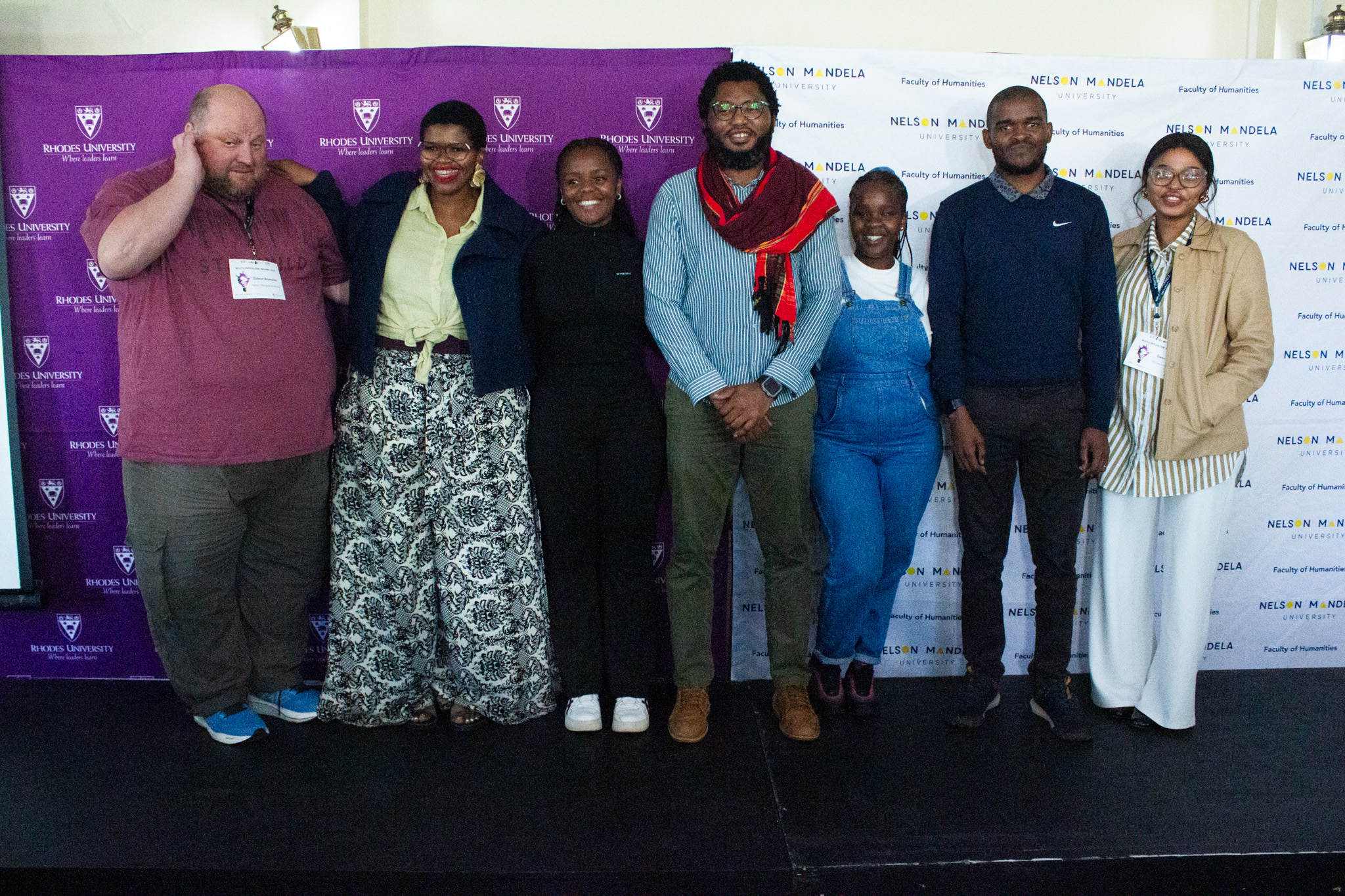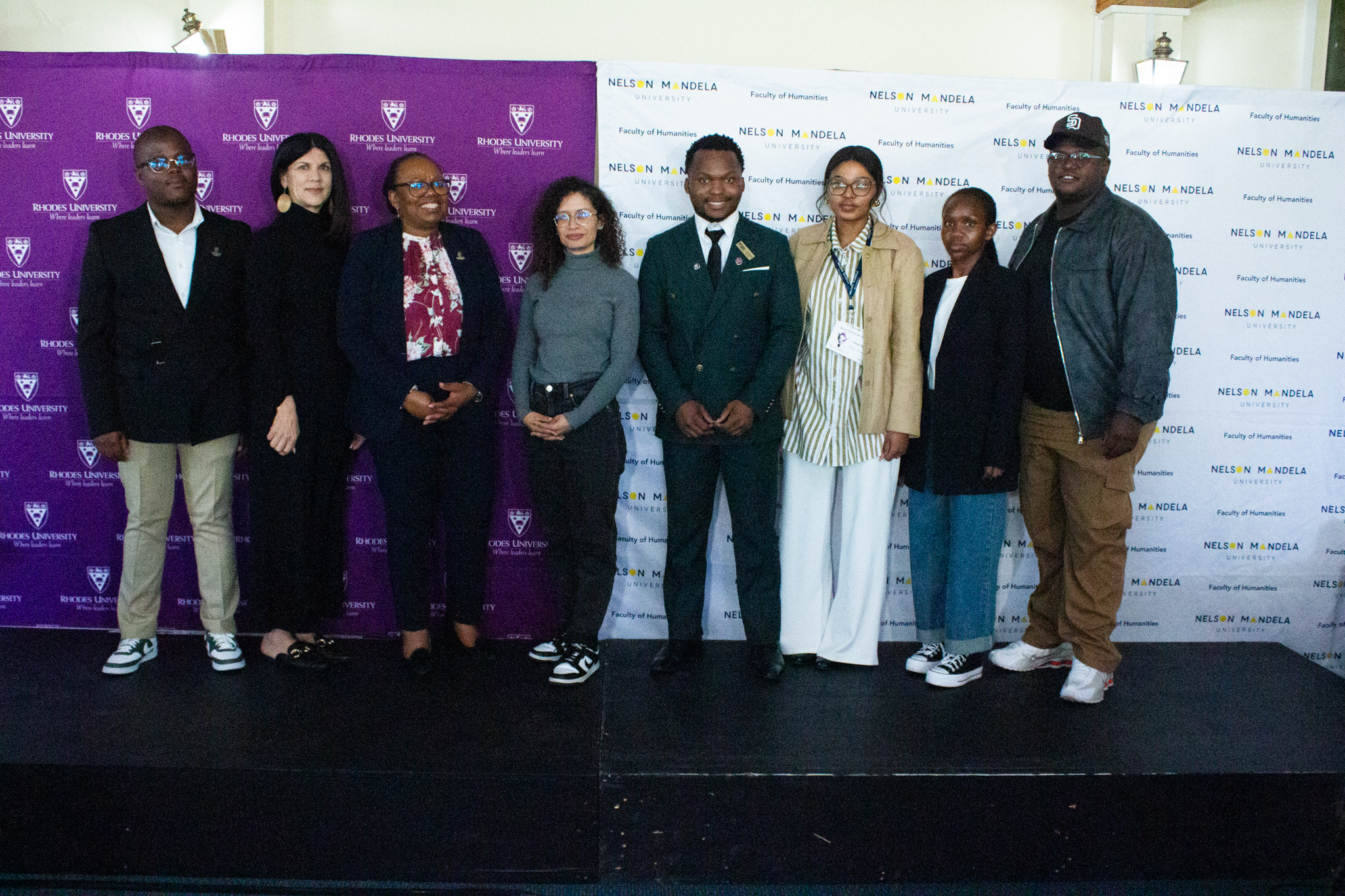
Centring African Languages in Scholarship: Rhodes and Nelson Mandela Universities Celebrate Milestones at their Multilingualism Indaba
Rhodes University (RU) and Nelson Mandela University co-hosted a two-day Multilingualism Indaba at the Postgraduate Village, Gavin Relly on 17–18 September 2025. Coming together in dialogue, reflection, and co-creation, the gathering celebrated the milestones achieved so far in the Department of Higher Education and Training (DHET) -funded project through the University Capacity Development Programme (UCDP). This is a language implementation project designed to promote multilingualism in higher education. The event featured the exchange of strategies for implementing multilingualism and showcased tangible progress across both universities.
Day 1 opened with a warm welcome from Dr Claire Kelly, RU’s Director of Equity and Institutional Culture and opening remarks from Professor Dion Nkomo, NRF SARChI Chair: Intellectualisation of African Languages, Multilingualism, and Education at RU. The first keynote was delivered by Dr Wanga Gambushe, a lecturer at the University of Cape Town, whose notable contributions include the isiXhosa-English Cell Biology glossary and critical reflections on the Greater Dictionary of isiXhosa.
In his talk, Dr Gambushe presented on “Developing and Using isiXhosa Terminology in Higher Education: From Case Study to Practice.” His address not only provided theoretical grounding but also challenged the audience to create term equivalents for specialised terms such as centromere, chromatid, and chromosome. The keynote also highlighted the difficulties terminologists face, noting that the terminology development process often leans toward description rather than term creation, as the former is easier. He urged terminologists to move beyond overused transliteration by adopting strategies that simultaneously give students access to specialised terms and expand isiXhosa as a language.
Following the keynote, RU Language Development Project project manager and Extended Studies lecturer, Sisonke Mawonga, gave a detailed overview of the project’s inception, development, and impact across campus. The project has translated course outlines, tutorial questions, essays, examinations and transcribed research data and academic abstracts across faculties. She further presented an outline of the direction that the project is taking, which includes student development and that the project will focus on a more theorised framework of implementing multilingualism across the institution.
While underscoring the transformative value of African languages in higher education, Dr Zakhile Somlata, Head of the Department of Language and Literature at NMU, presented on “Recognising Varieties of isiXhosa in Higher Education: The Decoloniality Stance.” He emphasised that inclusivity and acceptance are essential to ensuring that languages continue to serve important domains rather than risk endangerment. Dr Somlata argued that embracing dialectal varieties keeps languages alive, and called for dismantling the false hierarchies between what is considered “standard” and “non-standard,” as these hinder inclusivity.
The day also featured promising initiatives aimed at advancing multilingualism. Anesipho Gqozo presented on how artificial intelligence, with human guidance, can assist in translating specialised educational terminology. In addition, African musical scholar and lecturers, Prof Boudina McConnachie and Kuhle Ngqezana launched the second season of the Afroloops Podcast, which integrates African languages to teach and share musical knowledge and culture worldwide. This included an exhibition with listening stations where the delegates got to sit and listen to the podcasts during event breaks. The day also featured promising initiatives at Nelson Mandela University, where Gideon Brunsdon showcased his student-centered approach in teaching in the Faculty of Science, while Mahlubandile Ntontela demonstrated how legal concepts are made available in IsiXhosa in the Faculty of Law.
.jpg)
Day 2 began with a recap of Day 1, facilitated by Sisonke Mawonga, who then introduced the keynote speaker, Professor Pamela Maseko, Executive Dean of the Faculty of Humanities at Nelson Mandela University. With more than three decades of experience in higher education and global recognition as a historical sociolinguist, Prof Maseko’s address was highly anticipated. Her keynote, titled “When the Archives Speaks in African Tongues: Language, Memory and the Early South African Intellectual Imagination,” explored the relationship between language, knowledge, and power, interrogating how certain archived knowledge can be used in advancing multilingualism in higher education.
Prof Maseko argued that the historiography of multilingualism in South Africa must be revisited to include narratives written in indigenous languages. Drawing on ephemeral literary productions such as 19th-century newspapers and 18th-century historical novels, she reflected on the deep links between epistemologies and power. She proposed strategies for reclaiming knowledge from African languages, alongside diversification, decolonisation, and transformation of post-apartheid curricula. Prof Maseko further encouraged the intellectualisation of glossaries and translations already produced, affirming their scholarly value.
Day 2 also featured presentations and panel discussions showcasing diverse approaches to multilingualism. Student translators shared reflections on balancing fidelity to the source text with accessibility for readers, strategies for handling “untranslatable” concepts, and innovative ways of developing multilingual chatbots.
To affirm its commitment to practical change, this year’s Indaba also launched a book titled “Ulwimi kwezeMfundo kwiNtlalopolitiko noLuntu” supported by the School of Languages and Literatures and the Office of Equity and Institutional Culture. This groundbreaking volume challenges misconceptions that urban vernaculars are unstandardised and underdeveloped. Editors of this book, Professor Linda Kwatsha, who has been teaching isiXhosa for three decades between NMU and RU’s School of Languages and Literatures, as well as Dr Simthembile Xeketwana, a senior lecturer in the African Languages Department at Stellenbosch University, had a dialogue with Prof Pamela Maseko.
The book aims to encourage students to write theses and dissertations in African languages, demonstrating the existence of rich corpora. It shows that isiXhosa can serve as a language of science, with contributors coining and standardising terminology to address gaps. The volume also includes guidelines for designing assessments aligned with Bloom’s Taxonomy, offering creative ways to deter over-reliance on artificial intelligence tools. Despite challenges such as limited funding and a shortage of qualified reviewers, the project attracted committed researchers who prioritised the development of African languages over global recognition. Dr Xeketwana emphasised the need to disrupt academic spaces to show that African scholars are part of the decoloniality debate. He observed: “Iingqondo zethu ziqotyiwe zabulawa bubuKoloniyali, le ncwadi ke izama ukubuyisa nokubonisa ukuba ulwimi lusembindini wokwenza ibuyambo”. Concluding, Prof Kwatsha added that lessons can be drawn from Afrikaans, which flourished by being written for its own community. Uthe nathi masibeneengcazo-bungcali ezinokusinceda sicazulule uphando lwethu ukuze siphuhlise isintu sethu. Joining the dialogue commenting on the book were some of the contributors of this book, Dr Nozuko Xekwa, Dr Sinoyolo Nokutywa, and Dr Nompumelelo Kapa who shared more insight on how they advanced isiXhosa in their respective chapters.
The Indaba and the book launch concluded with reflections from Chanel Van De Merwe and Nompumelelo Babeli respectively, who thanked distinguished guests, editors, contributors, and speakers for their participation. The day closed with a celebration of the book launch, marked by cocktails and music.

